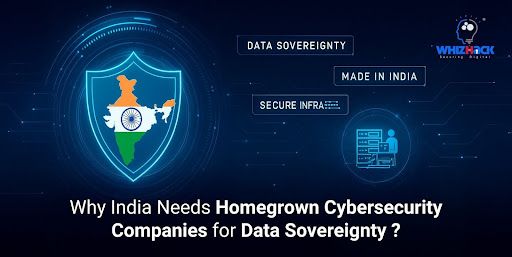Why India Needs Homegrown Cybersecurity Companies for Data Sovereignty
Blog / 4 min read / Saurav Singh

As cloud adoption grows and global data flows become the norm, India faces a critical challenge: protecting national digital infrastructure while maintaining full control over its data. This concern lies at the heart of data sovereignty in India. This blog post discusses the multiple advantages of using an integrated cybersecurity solution, as well as its effectiveness in combating changing cyber threats.
To address it effectively, the country must invest in and strengthen domestic cybersecurity capabilities. A trusted cybersecurity company in India can provide not only technical solutions but also legal assurance that sensitive data remains protected under Indian jurisdiction. This shift is essential to reduce dependence on foreign providers and to uphold the integrity of India's digital economy.
1. Foreign Reliance Undermines Legal Control
When Indian data is managed by international vendors, it becomes subject to foreign laws. For instance, data stored on cloud servers operated by global firms could be accessed through legal mechanisms like the US CLOUD Act. This weakens data sovereignty in India and risks exposing sensitive information to outside governments.
Homegrown cybersecurity companies can help organisations retain full control over their data. With local operations, storage, and governance, these firms enable legal clarity and compliance with Indian data protection laws.
2. Domestic Compliance Demands Local Expertise
India’s Digital Personal Data Protection Act and sector-specific frameworks in banking, insurance, and telecom now require stricter data handling standards. These rules are best interpreted and implemented by cybersecurity companies in India that are directly aligned with regulatory expectations.
Whether it’s building secure cloud infrastructure or designing data classification policies, a cybersecurity company in India brings contextual understanding that global vendors may lack. This ensures end-to-end compliance with national frameworks.
3. India-Specific Infrastructure Requires Tailored Solutions
Smart city projects, digital public goods, and platforms like Aadhaar have unique requirements. Local vendors understand the mix of rural connectivity, legacy systems, and multilingual support needed to secure these networks.
Unlike global software, solutions developed by Indian cybersecurity firms are designed for Indian conditions. Whether it’s protecting SCADA systems or securing IoT in agriculture, these companies offer regionally optimised responses.
This is why organisations increasingly rely on the specialised cybersecurity companies India has to offer for tools that are built to work in India's diverse environments.
4. Building India’s Strategic Digital Autonomy
Countries such as China, Russia, and France have prioritised national data protection by encouraging local technology ecosystems. Enabling data sovereignty of India is a matter of long-term national resilience for the country.
A vibrant community of cybersecurity companies in India is central to that mission. These companies help safeguard not just private-sector networks but also critical government infrastructure, including defence, transportation, and energy systems.
By investing in a cybersecurity company in India, organisations contribute to national security and reduce dependency on foreign software during periods of geopolitical uncertainty.
5. Economic Multiplier and Talent Retention
Supporting domestic providers creates high-skilled jobs, accelerates innovation, and keeps Indian talent working on national priorities. It also increases export opportunities for local solutions that are compliant with global standards.
Successful Indian cybersecurity firms are already setting benchmarks for innovation and enterprise-grade security. These companies prove that India can lead in a space once dominated by multinational vendors.
Strengthening cybersecurity companies in India also helps curb brain drain and fosters a sustainable, future-ready workforce.
6. Trusted Local Partnerships and Cultural Fit
Trust is a key component of cybersecurity. Working with a cybersecurity company in India means dealing with professionals who understand Indian business culture, languages, and market dynamics. This increases alignment and minimises friction during audits, implementation, and incident response.
In sectors like banking and healthcare, where breach notification laws and public accountability matter, having a local partner simplifies governance and transparency. Many organisations now prefer to work with cybersecurity companies in India for exactly this reason.
7. Enabling Sovereign Cloud and Data Residency
India’s push toward sovereign cloud platforms, including those supported by MeitY and NIC, highlights the need for data to remain under Indian legal control. These platforms require airtight security managed within national borders.
The cybersecurity companies India has to offer are now powering these sovereign cloud initiatives. Their solutions are designed with India-specific encryption policies, access controls, and infrastructure localisation. This is essential for maintaining the data sovereignty of India.
Public Policy and Strategic Alignment
As India strengthens its data protection laws and expands its digital footprint, policy support for homegrown cybersecurity providers is growing. The government now requires local certification for equipment in surveillance and telecom. The shift toward trusted sources of technology is reshaping procurement strategies across ministries.
This makes it more important than ever to partner with a cybersecurity company in India. Domestic vendors not only support regulatory compliance but also contribute to building the data sovereignty India aims to achieve.
Conclusion
Ensuring data sovereignty in India requires more than compliance. It demands trust, control, and capability rooted in the country’s own technology ecosystem.
By supporting cybersecurity companies in India, organisations can meet regulatory goals, gain localised protection, and contribute to national digital strength. Whether it’s through sovereign cloud deployments, zero-trust architecture, or endpoint defence, the path forward depends on strong partnerships with local expertise.
Let’s Start the Conversation
Is your organisation working with a cybersecurity company in India that understands local law, infrastructure, and culture? Are your cloud systems and endpoint protections aligned with the data sovereignty of India? Can your security provider deliver full-stack protection and onshore response within Indian jurisdiction?
Reach out to WhizHack Technologies to schedule a cybersecurity consultation built around India’s national priorities. Together, we can strengthen the security foundation of your digital assets and support the sovereignty India is striving to secure.



